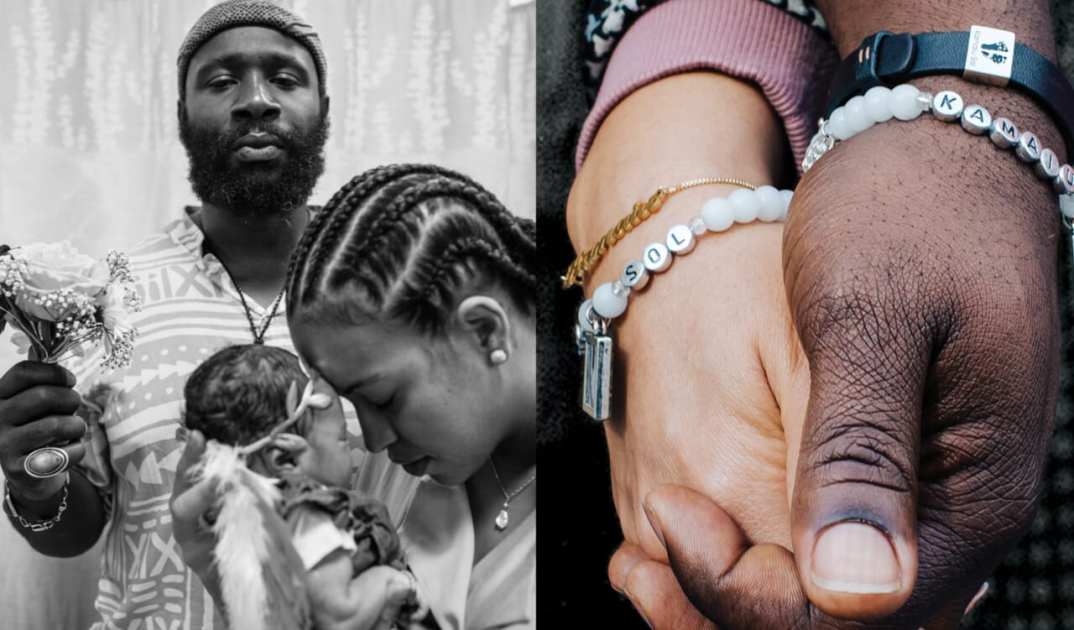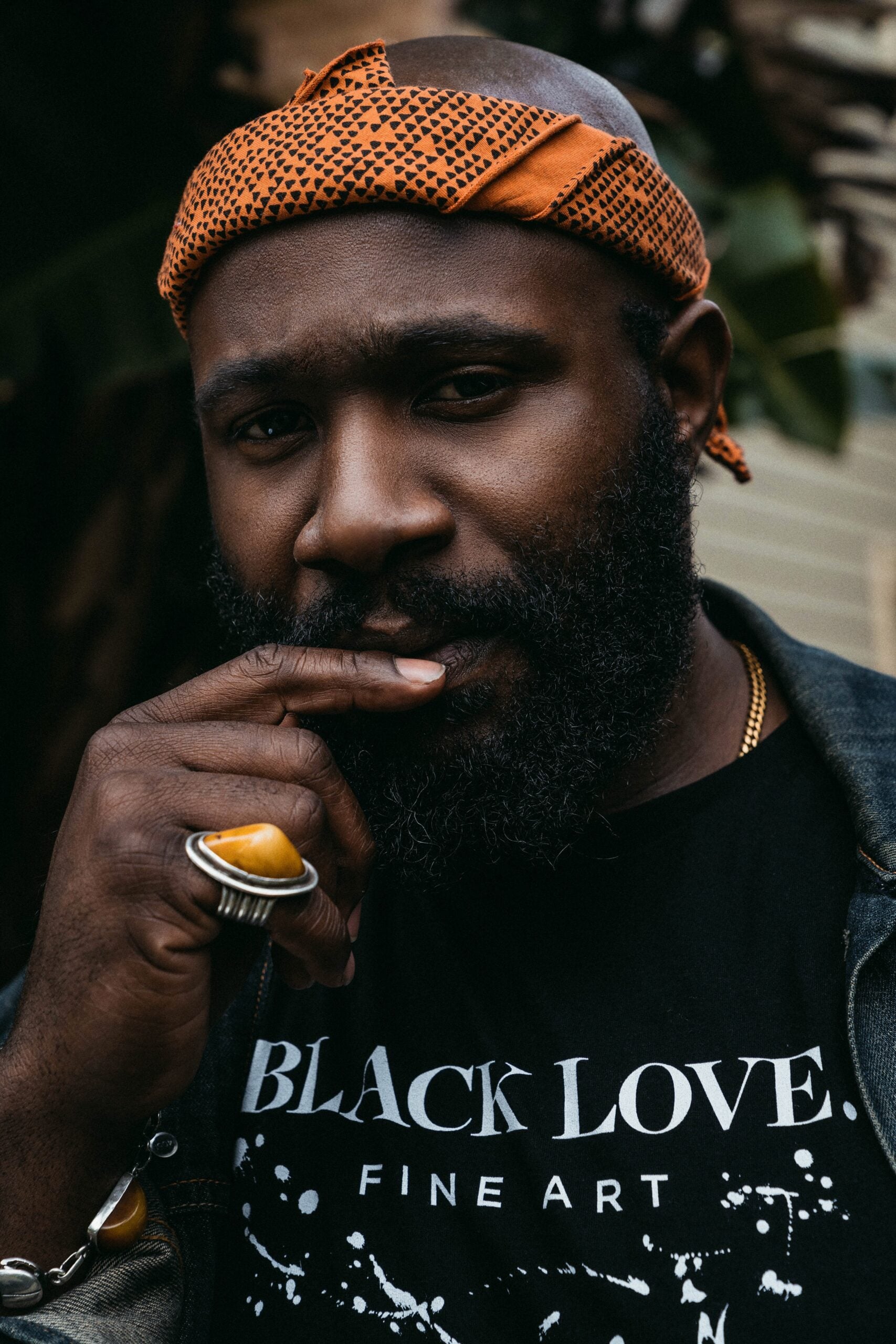What I learned about grief on my first Father’s Day as an angel parent
OPINION: Karega Bailey shares the journey of losing his daughter shortly after birth, and how he and his wife are using their pain for collective healing

A year ago, I joked with my pregnant wife about picking out my first Father’s Day card. Clowning her, I told her I wasn’t a corny daddy and that my card better have “The Sauce.” I cherish this memory, documented on Instagram because it’s coupled with laughter that might not have otherwise come for me this Father’s Day.
As I process my own grief, I’m aware that there is also inescapable collective grief happening around me, and that reality is further complicated by being Black in America. We’ve seen COVID-19 cause the mortality rate to skyrocket, all while disproportionately affecting the conditional living of Black Lives. And as we try to come to terms with the gravity of that matter, we witnessed yet again, more Black Lives being taken at the hands of state-sanctioned violence.
READ MORE: White supremacy takes so much from us already, don’t let it take your grief too
I’m not sure if you can relate, but for me, it feels like there are two explosions happening, simultaneously, in my proximity. One is happening in the world around me, and its aftershock is causing the other to happen inside of me (within). As my brain tries to make sense of it, I end up processing more information than I can handle, and by default, it feels like a processing error.
Not to mention the weight of processing the Black experience while being Black in America. It feels like a psycho-social crisis to which there is no reprieve. Political disagreements and judgment pollute our pathways of communication and dissension is widespread.
It’s seriously a lot to unpack. Since George Floyd’s death especially, I’ve experienced a lot of demonstration spaces that end up feeling more like grief processing spaces. But then again, admittedly, I know that I am hypersensitive to grief these days and it’s been this way for the last 9 months.
On September 30, 2019, my wife and I became Angel Parents to a beautiful #BabyBaileyGirl named Kamaiu SOL. We experienced a radiant 41-week pregnancy in the seventh year of our marriage, and by this time, we’d been together 15 years. Our journey to becoming her parents brought about the deepest joy we have ever known. The excitement in our family was unmatched.
I was the last of my mother’s 8 children to bring forth a child and Felicia’s mothers’ last grandchild was 17 years prior. Throughout the entire pregnancy, we were adorned with love. Family and close friends came to help us nest and our mothers came to stay with us during the last few weeks of the pregnancy.
READ MORE: Too many pregnancy books don’t keep it real, author Nancy Redd says
I remember coming downstairs in the middle of the night and seeing them in prayer. That was their thing. Felicia and I are so blessed to have both of our mothers in our lives. But not even a praying mother could save us from the grief we would come to know.
Our precious Baby Bailey Girl was born 6:19 a.m., and passed shortly after birth. As we entered the hospital that morning, we did so without any fear and distress. We were patient in awaiting her arrival and had every reason to believe that Kamaiu would be coming home with us and that we would be spending the rest of our lives with her. That’s what we planned for, that’s what we prepared for.
But instead we were given the journey of Angel Parents. It is a grief that has no reference and we are still learning how to do it each day.
In my learning of what it means to be an Angel Parent, I had to learn an entirely new type of gentleness. I anticipated being gentle with my wife and daughter, but I had to learn how to be gentle with myself. I had to learn that experiencing grief didn’t mean that something was wrong with me and that my grief did not need to be fixed. I had to learn to be present with my grief, and I learned how to do that better when I came into the understanding that grief is love.
But it’s often hard to grasp that understanding because grief is love after a loss and it’s the permanency of the loss that makes everything else disorienting. This loss allowed me to see that America is severely under-informed as a society on how to have conversations about grief, and for the most part, are uncomfortable around grief.
Our society loves the strong overcomer narrative because it’s easier to hold than grief is. Happiness is easier to get along with. Even as close friends grieve for our loss, they also grieved who we used to be and it takes time for them, too, to reconcile with their new reality. So, as they were doing their best to be gentle with us as we found our footing, we too, were learning to be gentle with people whose grief looked different than ours. Uniquely enough, it became an experience in radical gentleness that we all needed.
I thank God grief didn’t take us out. Yes, it broke our hearts, but it also broke open a new dimension in our capacity to love. To hold the grief, we had to reconfigure our relationship, and that process molded us into a love we’ve never seen before. At the time, we had no clue how powerful this pivot would be, but having an increased capacity to love has been my saving grace in 2020, particularly in this COVID-19/Black uprising era.
When the world is offering noise, I remember who I have become and what I have learned since my Kamaiu SOL was born. Her first name means “silent warrior, one who loves relentlessly.” Her middle name means “Source of Light.” I try to show up with these competencies wherever I go. Especially wherever I see Black people, because we deserve to be loved relentlessly.
We deserve reminders to be gentle with ourselves. Especially when we have a country that insists on devaluing our humanity. It makes me angry enough to fight, but anger is a misleading emotion. So in turn, I use the grief I feel to inform my ability to fight with love. Because grief is love. And nothing is more powerful than love.
Amidst marching, organizing, and lending my gifts to the movement of Black Liberation, Kamaiu SOL has been my greatest teacher. She has helped me learn how to create the conditions that alleviate our own suffering. She has helped me to create a work that encourages us to take inventory of our own hearts and remove the things occupying love’s territory.
With her relentless love, my wife and I created a toolkit that offers daily gentle reminders that help to develop new habits of mind. This toolkit, affectionately named SOL Affirmations, was previously only available by book. However, during our pregnancy with Kamaiu, we started to record the SOL Affirmations album in hopes that, one day, our students and their families could experience it together.
But “one day” wasn’t going to come fast enough for the times we are living in. The more we learned about our grief, the easier it was for us to see that the world around us was grieving, too. So today, here is a cherished gift from Kamaiu, Karega, and Felicia. On this Father’s Day of 2020, we present SOL Affirmations volume 1.
 Karega Bailey is an angel parent, a social-emotional healing practitioner, and an award-winning educator and recording artist. He is a nationally renowned Peace Advocate and the Founding Dean of Culture of Roses in Concrete Community School in Oakland, CA. He is the author of SOL Affirmations and co-founder and lead facilitator for BE-Imaginative, a transformative safe space lead by a collective of artists and activists dedicated to disrupting gun violence and healing Black and Brown communities through innovative multi-dimensional storytelling.
Karega Bailey is an angel parent, a social-emotional healing practitioner, and an award-winning educator and recording artist. He is a nationally renowned Peace Advocate and the Founding Dean of Culture of Roses in Concrete Community School in Oakland, CA. He is the author of SOL Affirmations and co-founder and lead facilitator for BE-Imaginative, a transformative safe space lead by a collective of artists and activists dedicated to disrupting gun violence and healing Black and Brown communities through innovative multi-dimensional storytelling.
Have you subscribed to theGrio’s new podcast “Dear Culture”? Download our newest episodes now!
https://open.spotify.com/episode/0RCfxfB5wJmOf0n18l2pEk
https://open.spotify.com/episode/7EqV56xsXcxMaCQhYDdQhc
